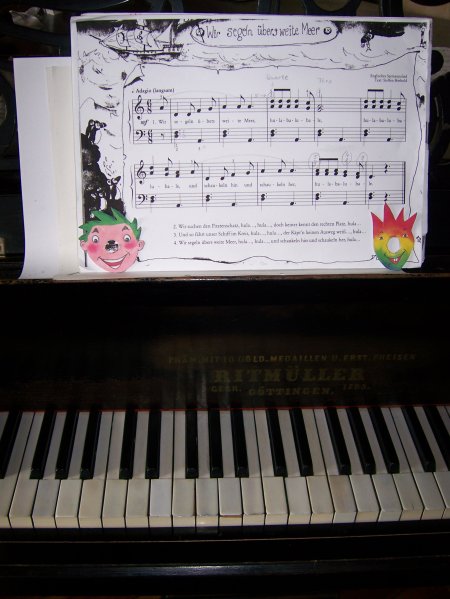on the future of music in berlin

I am currently a bit concerned about the future of music perception in Berlin.
To be more precise I am not so much concerned about the future of pop music but rather about the future of socalled “classical” and/or “serious” music. The term “classical” may be a bit too narrow in order to describe modern “serious” music with their ability to embrace influences from classical-/native-/avant-
garde/jazz-/pop-/electronic music, but I hope it is somewhat clear what I mean. In short: I mean to talk about music which may not immediately be “catchy”, i.e. music which may need some prior knowledge for a better appreciation – and with a slight emphasis on classical music.
Moreover I am not so concerned about the music quality itself, because Berlin has an excellent infrastructure for professional classical music – just to name a few institutions: the berlin philarmonics, 3 operas (actually 4 if one includes the marvelous Neukoellner Oper), at least 50 orchestras (!) various concert halls etc. – no – it is rather the music education of future listeners and performers, which is in disorder.
There are very helpful private initiatives, like Simon Rattles/Berlin philharmonics initiative future@bphil, the musikschulstiftung berlin or e.g. the initiative rapshody in school. There is still an exisiting infrastructure of socalled music schools in Berlin, which make up for a big part of music education, since learning an instrument is at these schools partially subsidized. Moreover these schools often act as a decentralized meeting place for music life in the various districts of Berlin.
However the music schools had to endure major budget cuts over the last years (in particular almost all teachers are now not anymore employed but on a free contract). Likewise the music education in public schools is permanently enduring cuts. The last action exemplifying this is the unclear future of Berlin public primary schools with emphasis on music education (->protest site).
It is a wellknown fact that music lessons may e.g. enhance intelligence (here a report from 2004). Music may serve as a possibility to integrate different cultures (see e.g. this israeli-palestinian project) and so on. Thus the federal state of NordRheinWestfalia introduced a program, where each child should learn an instrument.
Concluding – everyone knows that Berlin is broke (last not least also due to the massive infrastructural tasks after reunification) hence if the federal state of Germany wants to keep its representational cultural center then there must be more backing. Private initiatives don’t (and probably can’t) take on the major share of necessary cultural investments (especially the educational ones). It is unacceptable that the financial fights over cultural institutions are made on the backs of Berlin kids.
The above listing of private initiatives of supporting music life in Berlin is by far not exhaustive and in fact it is probably more the sum of many individuals which makes the difference – music teachers who give free (or very cheap) lessons, musicians who run a youth orchestra in outskirts etc. In particular this kind of music production can have a very high standard in terms of “serious” music – as an example see e.g. this cooperation of the music school of Marzahn Hellersdorf with composer Henze.
And last but not least this set of problems is not confined to Berlin. In some countries music education relies even more on private initiative. As a result in these countries classical music is somewhat often seen as a music for the “elite” (because no one else can afford it). And again an example for an individual initiative: last week I was on a classical music concert with american composer Haskell Small and american pianist Soheil Nasseri in the Konzerthaus Berlin. Soheil Nasseri performed in over 60 schools in front of 25.000 pupils! Despite this presumably exhausting work Soheil Nasseri managed to give 18 Solo concerts with completely different programs (including 28 of the 32 sonatas of Beethoven): 13 concerts where in the Weill Recital Hall of Carnegie Hall and 5 in the Alice Tully Hall of Lincoln Center. In fact he wants to play all works of Beethoven before his 250th birthday in 2020. No wonder that the “New Yorker” called him “one of the most productive solists of New York”. If I understood correctly his agents booked him for February 27th to play in the Kammermusiksaal of the Berlin Philharmonie.
November 14th, 2007 at 4:44 am
I enjoyed reading your article. It is a shame because my goal is to go to Berlin in two or three years to study the cello. I was just wondering if there are any music schools that you would reccommend?
November 14th, 2007 at 10:25 pm
Thanks for the comment. In the post I was actually more referring to socalled
music schools, which are preparatory schools for studying an instrument.
There are two major institutions for professional studies in Berlin, namely
the Hochschule für Musik Hanns Eisler and the Berlin University of the Arts. However they also had budget cuts (like all universities in Berlin) :(
June 30th, 2008 at 6:35 am
Budget cuts.. It is unacceptable that the financial fights over cultural institutions are made on the backs of Berlin kids.